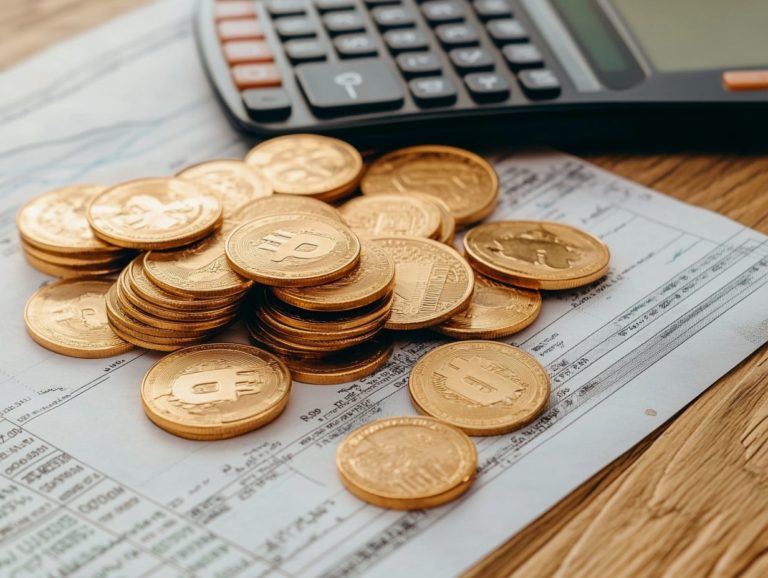Tax Compliance for Precious Metals Dealers
Navigating the intricate world of tax compliance can be especially challenging for precious metals dealers. Understanding your tax obligations is vital for maintaining legal compliance and securing the success of your business.
This article delves into the various types of taxes you might encounter, including sales tax, income tax, and capital gains tax.
Additionally, it addresses essential reporting requirements, highlights common pitfalls to avoid, and offers practical tips for ensuring compliance. Whether you re a seasoned dealer or just embarking on your journey, this guide equips you with the knowledge necessary to manage your tax responsibilities effectively.
Contents
- Key Takeaways:
- Overview of Tax Compliance for Precious Metals Dealers
- Types of Taxes for Precious Metals Dealers
- Reporting Requirements for Precious Metals Dealers
- Common Tax Compliance Mistakes
- Tips for Staying Tax Compliant
- Frequently Asked Questions
- What is the tax compliance process for precious metals dealers?
- Do I need to pay taxes on the precious metals I buy for my business?
- Are there any tax exemptions for precious metals dealers?
- What types of taxes do precious metals dealers need to be aware of?
- Do I need to keep records of my precious metals transactions for tax purposes?
- What happens if I fail to comply with tax laws as a precious metals dealer?
Key Takeaways:

- Precious metals dealers are subject to various types of taxes, including sales tax, income tax, and capital gains tax.
- Immediate compliance with reporting requirements, such as Form 8300 and annual reporting, is crucial to avoid penalties and maintain good standing with tax authorities.
- To stay tax compliant, it is important for precious metals dealers to keep accurate records and work with a tax professional to ensure proper tax collection and reporting.
Overview of Tax Compliance for Precious Metals Dealers
Tax compliance is essential for precious metals dealers as they navigate the intricate world of Internal Revenue Service (IRS) regulations, especially concerning collectibles like gold and silver.
You must be fully aware of your obligations regarding assets of value, which includes grasping the tax rates for both long-term and short-term gains. Managing your records meticulously helps prevent potential audits from tax authorities.
Accurate reporting and thorough documentation can profoundly influence the success and sustainability of your business in a competitive trading landscape.
Understanding Tax Obligations
Understanding your tax obligations is crucial as you navigate the regulatory framework established by the IRS, which governs the taxation of assets of value, including collectibles like gold and silver.
As a dealer in these precious commodities, you are required to comply with both federal and state tax regulations, which can vary significantly based on your jurisdiction. Each transaction can trigger capital gains taxes, and some states may impose additional sales tax on the exchange of precious metals. This complex landscape highlights the importance of working with tax professionals, such as Certified Public Accountants (CPAs), who specialize in tax compliance for individual precious metals investors.
These experts can offer valuable insights for effective tax planning, allowing you to strategically manage your tax liabilities while ensuring complete compliance with all regulatory requirements.
Types of Taxes for Precious Metals Dealers
As a precious metals dealer, you will face a variety of taxes, such as sales tax, income tax, and capital gains tax. Each of these comes with specific regulations dictated by the IRS, and it s crucial for you to navigate these rules carefully.
Doing so will not only ensure your compliance but also help you minimize your overall tax liability.
Sales Tax
Sales tax on precious metals varies by state, and it s a crucial factor for you as a dealer of collectibles. The IRS has specific guidelines that dictate how these taxes are applied; understanding them can make a significant difference in your pricing strategies and profit margins.
For example, while many states do impose taxes on the sale of precious metals, some provide exemptions for certain collectibles, such as rare coins or bullion that meet specific criteria. Understanding the tax implications of transferring precious metals is essential for you to stay well-informed about your state’s regulations to ensure compliance, as violations could lead to penalties you certainly want to avoid.
By keeping meticulous records and leveraging sales tax automation tools, you can deftly navigate these complexities. By adopting this approach, you can confidently maintain compliance with both state and federal standards, ultimately minimizing any tax-related risks that could threaten your business.
Income Tax

Income tax plays a pivotal role in the financial operations of precious metals dealers. The IRS mandates that all earnings from trading activities be reported as regular earnings.
You need to keep detailed records for every sale and understand the intricacies of relevant tax laws. As a dealer, stay sharp and report every detail while also tracking potential expenses you can subtract from your income related to operational costs, inventory, and marketing, including the tax implications of precious metals in business transactions.
Engaging a qualified CPA is essential for successfully navigating the complexities of tax regulations in the precious metals marketplace. A knowledgeable CPA can offer invaluable insights into tax strategies and ensure compliance, ultimately helping you manage your tax liabilities more effectively and maximize your financial returns. Understanding the tax consequences of donating precious metals is also crucial in this process.
Capital Gains Tax
Capital gains tax applies to the profits you realize from selling precious metals. The IRS distinguishes between long-term and short-term capital gains based on how long you’ve held the asset.
This distinction can greatly influence how you plan your transactions. If you hold an asset for one year or less, you’ll face short-term capital gains, taxed at ordinary income tax rates. This can significantly eat into your overall returns!
Conversely, if you’ve held the asset for over a year, you benefit from long-term gains, which usually come with lower tax rates, enhancing your net profitability. Understanding these nuances is essential for anyone involved in the precious metals market.
Effective tax management strategies can greatly impact your after-tax returns, allowing you to capitalize on your investments more efficiently.
Employing tactics such as timing your sales wisely or considering the impact of any losses can be pivotal in minimizing your tax liabilities.
Reporting Requirements for Precious Metals Dealers
As a precious metals dealer, you must comply with specific reporting requirements established by the IRS. This includes the important task of completing Form 8300 for any cash transactions exceeding $10,000.
Adhering to these regulations is crucial for maintaining compliance in the collectibles market.
Form 8300
Form 8300 is an essential tax document for precious metals dealers. It s imperative that you file it with the IRS for any cash transactions exceeding $10,000. This requirement fosters transparency in the management of significant payments.
This obligation extends to various financial institutions and businesses, highlighting the critical need for timely reporting to avoid penalties. As a precious metals dealer, ensure that this form is filed within 15 days of the transaction!
If you re dealing in cash payments for goods like coins and bullion, this documentation is a must.
Adhering to Form 8300 not only bolsters the integrity of your financial transactions but also plays a key role in combating money laundering and other illegal activities, all while ensuring compliance with IRS regulations.
Annual Reporting
Annual reporting is an essential aspect of tax compliance for precious metals dealers. Don t miss the crucial forms needed for reporting!
Failing to submit the required tax forms to the IRS can lead to severe penalties and increased scrutiny that you certainly want to avoid.
This process involves various forms, including IRS Form 1099-B, which you must use to report sales transactions accurately. It s imperative for your business to adhere to specific deadlines to avoid common pitfalls.
Missing these deadlines can result in financial penalties and even trigger a potential audit, underscoring the importance of meticulous record-keeping and timely submissions.
Understand that accurate reporting not only shields you from legal repercussions but also fosters trust with your clients and regulators in the closely monitored financial landscape of precious metals trading.
Common Tax Compliance Mistakes

Common tax compliance mistakes among precious metals dealers can lead to major challenges with the IRS. These reporting errors can lead to unexpected tax payments and may trigger a review by tax authorities.
It’s essential to stay informed to navigate this complex landscape successfully.
Failure to Collect and Remit Taxes
A common mistake is neglecting to collect and remit sales tax. This misstep can result in hefty penalties from the IRS and complicate overall tax compliance.
Overlooking tax obligations risks generating previously unpaid taxes. It can also lead to accrued interest and fines, which may jeopardize your cash flow and business viability.
Such oversights can attract attention from state revenue departments. They may initiate reviews that could lead to deeper scrutiny.
The consequences extend beyond monetary penalties; they can disrupt operations and erode customer trust. It s vital for these businesses to prioritize tax compliance.
Inaccurate Reporting
Inaccurate reporting on tax forms can create significant issues for dealers. The IRS may impose penalties for errors, resulting in audits or increased scrutiny.
These challenges often stem from poor record-keeping. Precise documentation is essential in the buying and selling of precious metals.
When transactions aren t documented correctly, tax filings become complicated. This raises the risk of misinterpretation by tax authorities and can strain your resources as you navigate inquiries.
Collaborating with experienced tax professionals is crucial. They can help ensure compliance and protect your business interests.
Tips for Staying Tax Compliant
Staying tax compliant is vital for precious metals dealers. By following actionable tips, you can adhere to IRS regulations and avoid costly mistakes.
Keeping Accurate Records
Accurate record-keeping is crucial for dealers. It provides necessary documentation for tax compliance and eases tax form preparation.
Meticulous records demonstrate the legitimacy of your transactions. They also serve as protection in case of an audit.
Maintain detailed accounts of purchase and sale invoices, inventory logs, and transaction receipts. Each financial activity should be documented.
These records are vital for assessing your profits and losses, which directly influence your tax obligations. Implement best practices by regularly updating records and using reliable accounting software.
Back up your data to prevent any loss. By following these strategies, you enhance your accuracy and transparency, making it simpler to interact with tax authorities.
Working with a Tax Professional

Collaborating with a tax professional, like a CPA, can significantly enhance your tax compliance as a precious metals dealer. Their expertise in navigating IRS regulations is invaluable for minimizing your tax liability.
With their extensive knowledge, they provide strategies to optimize your tax outcomes and help you leverage every available detection and credit. A tax expert offers essential insights into your investment-related tax obligations, helping you identify potential pitfalls and uncover opportunities for smart investing strategies that save you money on taxes.
By leveraging their experience, you can effectively plan for the future, aligning your tax strategies with your long-term business goals. This proactive approach ensures compliance with the latest tax codes and enhances your overall financial health, allowing you to focus on growth and sustainability in an increasingly complex market.
Frequently Asked Questions
What is the tax compliance process for precious metals dealers?
The tax compliance process involves following federal and state tax laws related to buying and selling precious metals. This includes reporting income and paying taxes on profits from these sales.
Do I need to pay taxes on the precious metals I buy for my business?
Yes, as a precious metals dealer, you must pay taxes on the metals purchased for your business unless you qualify for exemptions. Always consult a tax professional to stay ahead of the game!
Are there any tax exemptions for precious metals dealers?
Yes, there are certain exemptions available. Some states do not require sales tax on bullion purchases over a specific amount. Certain types of precious metals, like numismatic coins, may also have exemptions.
What types of taxes do precious metals dealers need to be aware of?
Precious metals dealers may need to pay income tax, sales tax, and capital gains tax on their business activities. Understand which taxes apply to your specific business and report them accordingly.
Do I need to keep records of my precious metals transactions for tax purposes?
Yes, maintaining detailed records of all transactions, including purchases and sales, is crucial. These records are necessary for reporting income and calculating taxes owed.
What happens if I fail to comply with tax laws as a precious metals dealer?
Failing to comply with tax laws can lead to penalties and fines from the IRS and state tax agencies. Stay up-to-date on tax laws and seek professional guidance if you have questions or concerns.














